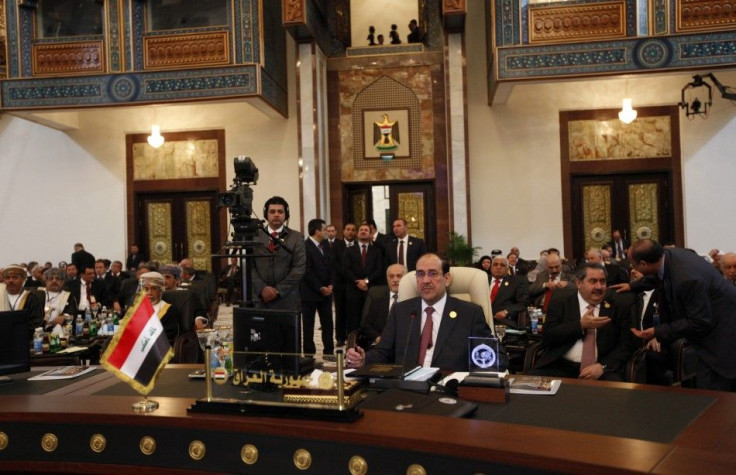Syria: Iraq PM Warns Against Arming Rebels

Iraqi Prime Minister Nuri al-Maliki said on Thursday that arming anyone in Syria could lead to a proxy war. Maliki made his comments during a speech at an Arab League summit in Baghdad, adding that diplomacy and a serious national dialogue are the only ways to stop the year-long violence in Syria.
Based on our experience in Iraq, the option to arm either side of the conflict will lead to a regional and international proxy war in Syria, Maliki said.
This option will prepare the ground for foreign military intervention in Syria and so infringe on the sovereignty of a brother Arab country.
The Syrian National Council -- the main opposition party challenging the rule of President Bashar al-Assad -- has pleaded with the Arab League and the Friends of Syria group to provide arms and supplies to rebel fighters. A group of defected government soldiers called the Free Syrian Army has been fighting against pro-Assad forces, but has been losing the war. The FSA has attempted to protect citizens and opposition protesters in cities like Homs and Damascus, but as its strength diminishes, the vulnerability of those they protect increases.
So far, all international parties have determined not to provide military support to either side in Syria. The UK said on Thursday that it will provide £500,000 ($795,000) to Syrian opposition groups, but Foreign Secretary William Hague added that the money is only for practical non-lethal support, the BBC reported.
However, Qatar and Saudi Arabia are both in favor of arming Syrian rebels. They have not done so publicly yet, but there are reports that the Saudis have already secretly sent military equipment to FSA members in Jordan. Jordan has denied the claim.
More than 9,000 people have been killed in Syria since violence began in March, 2011, and more than one million Syrians are in need of humanitarian assistance, according to the United Nations.
On Tuesday, Assad accepted a peace plan drawn up by UN-Arab League envoy Kofi Annan. The proposal calls for an open dialogue between Assad and the opposition, as well as the withdrawal of Syrian troops from opposition-dominated areas and immediate humanitarian access to those in need.
The Arab League is expected to endorse Annan's plan, although a number of nations, including Qatar and Saudi Arabia, are still calling for the removal of Assad. The Syrian opposition is also wary about the plan, citing previous fig-leaf reforms and instances earlier this year when Assad backed out of peace talks.
© Copyright IBTimes 2024. All rights reserved.











